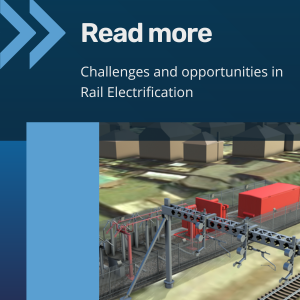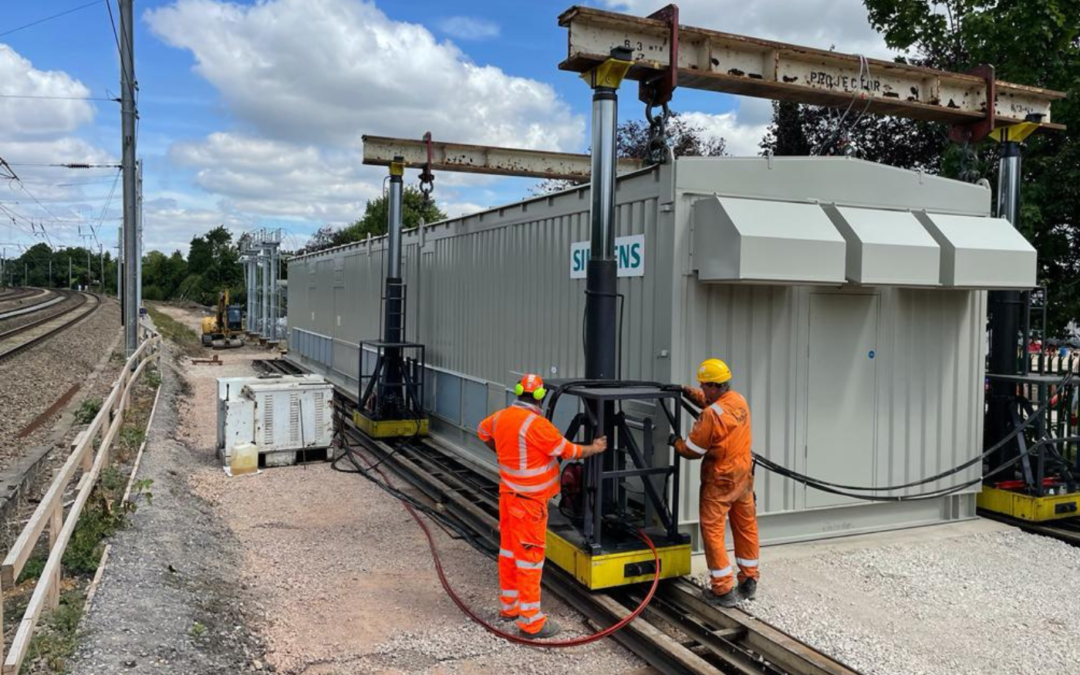Network Rail is upgrading and electrifying the Midland Main Line – a major railway line from London to Sheffield in Yorkshire via the East Midlands – to allow electric trains to run the full length of the service; a vital project to progress the decarbonisation of the UK’s transport system.
At WCS, we are providing survey and civil engineering design to various stages of the project for our client SPL Powerlines. We’re proud to lend our expertise to a project that is facilitating the UK’s transition to net zero emissions.
The £1.5 billion Midland Main Line upgrade is a long-term project; in our earlier case study, we provided an overview of our work between June 2020 and March 2022.
Let’s check in to share what we’ve been up to since – including providing civil design to enable the transportation of the UK’s largest ASG25 substation to site, implementing collaborative solutions to minimise project spend and resources, and substation civil design to power the electrification of a line.
Implementing collaborative solutions to minimise project spend and resources
The first phase of the Midland Main Line project – upgrading and electrifying the London to Corby line – is almost complete. WCS is completing the final stages of its civil engineering work for this phase of the project: designs for road rail access points (RRAP) at the Sharnbrook site.
In order to install the Sharnbrook RRAPs according to the original plans, there was an area of land that Network Rail would have needed to purchase. However, to preserve budget, resources, and maintain positive community relations, land take must be kept to a minimum.
SPL Powerlines presented Network Rail with an alternative scheme – moving elements of the overhead line electrification (OLE) switching equipment to keep the works within the existing site boundary. Our team at WCS provided the civil engineering design to realise this concept and to evidence that it would work in practice, with the support of our regular partners and OLE specialists, Andromeda Engineering.
While works surrounding the movement of OLE equipment can be significant, compared to the costs and resources required of land acquisition, this alternative option was greeted by Network Rail as a welcome alternative. Network Rail approved the alternative and the scheme will be fast-tracked for delivery by September 2024.
This is an example of partners working together effectively to devise and implement solutions to challenges that deliver on cost-effectiveness and time-efficiency.
Substation civil design to power the electrification of a line
The project required the electrification of the route running between Luton and Market Harborough; this required the installation of new OLE structures and wires, and new substations.
WCS provided civil engineering support for three substations: Napsbury, East Hyde, and Braybrooke. WCS’ support comprised designs for elements including foundations, drainage, fencing, substation access roads, switch farms and cable routes, along with a number of RRAPs, pedestrian access points (for Network Rail and its contractors) to access the railway for maintenance and access pathways.
This work started in 2022 and WCS’ involvement is now complete, with the as-built drawings handed over.
Transporting the UK’s largest ASG25 substation to site
The aim of the next phase of the programme – referred to as K2W (Kettering to Wigston) or RS1 – is to electrify and decarbonise the section of the line from Kettering to Wigston.
We were part of a team charged with ensuring the successful delivery of the UK’s largest ASG25 substation to site. Totalling more than 44 meters in length, the Wigston mid-point auto transformer site (MPATS) needed to be split into three sections for delivery. WCS provided temporary and permanent civil design to ensure all three modules could be transported safely.
SPL Powerlines’ approach was to use a gantry lifting system to move the substation into its final position instead of the more conventional route of crane-use. The modules were loaded onto lorries and then driven onto the foundations directly. The lorries then manoeuvred out, and the gantries lowered the modules into place.
This approach means that the railway does not need to close while works are taking place, as it presents no safety issues; if a crane was in use, the line would need to be closed as it would present a safety risk to passengers and staff.
Given the scale of the project and challenging elements of the site – the access point was close to lineside neighbours and went through an existing bridge portal – months of site preparations were undertaken.
The modules were too tall to fit under the railway bridge; excavating down was the only solution to enable access. We undertook work to determine the depth of excavation required; we completed survey works and a full set of drawings to show how the modules could be delivered without damaging either the bridge or the modules.
We also prepared drawings to show how the lorries could turn into the site, which identified the need to remove existing fencing temporarily.
Collaboration was the key to successful delivery, and we worked effectively with SPL Powerlines to ensure successful completion, with all delivery works completed safely and on time.
WCS was also tasked with providing temporary works civils design to facilitate the installation of the modular buildings at the East Langton substation site, and track section civil design for the Market Harborough and Kilby Bridge sites.
“WCS is proud to contribute its expertise to the upgrade and electrification of the Midland Main Line,” says Nick Lowe, Director at Whitfield Consulting Services. “This case study demonstrates the power of collaboration and creative problem-solving in advancing the decarbonisation of the UK’s rail transport system. We look forward to seeing the next phases of this scheme come to life, and continuing to play our part in the fruition of such a vital project.”
To find out more about our rail experience click here. Or, if you’d like to discuss your next project, please get in touch by emailing info@wcs-consult.co.uk or calling +44(0)20 3581 7847.

